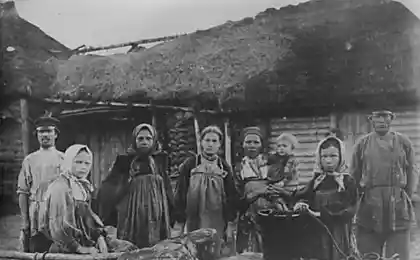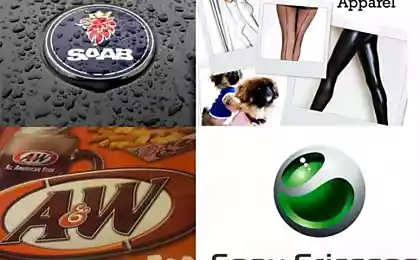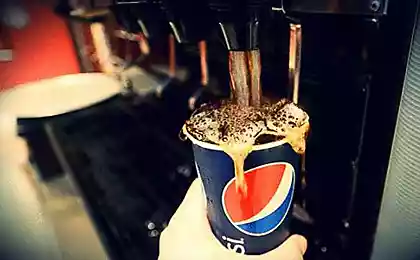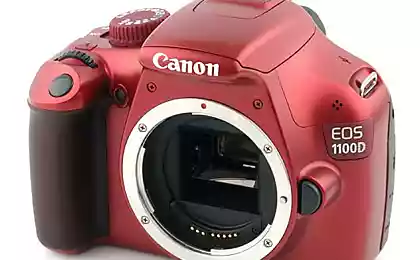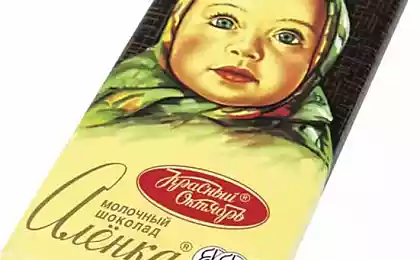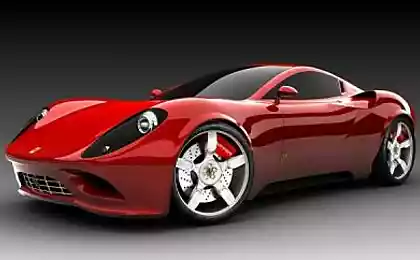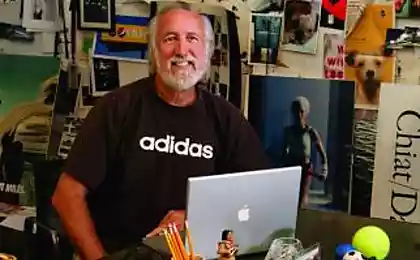838
Where did the brands (6 photos)
Article from adme.ru
Why are some Russian and Western brands do not take root in the Russian market? The reasons for this are many, and each case is unique disastrous. Sometimes the culprit naming illiterate, sometimes - a bad brand character, and sometimes wrong positioning.
Skeletons
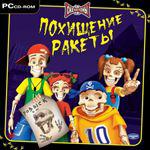
Products under the brand name "Skeleton" went on sale in autumn 2004 as a line of dairy products for children, out-of-age consumption Rastishka. Neymer and top management of the campaign rightly decided that children aged 9 to 14 years old love nestrashnye horror. Brand characters become heroes skeleton - on product packaging painted skeletons, skull and crossbones, and the campaign slogan - "Take care of the children of his skeleton».
But buyers-just scared and parents names and the four characters. Danone's even threatened litigation: Muscovite Yevgeny Martynov required stop output, injuring the child's psyche. On the part of outraged citizens rose up and some advertisers and market participants. "Skull with bones should be placed not on the packaging of products, and to draw on the poison for mice - commented the creative director of DDB Russia Kirill Smirnov.- What children like violence, does not mean that it should promote."
Later Martynov refused the claim, but the line after some time still had to fold. Beer "Ruski»
Kazan company "East is Red" brand led "Ruski" to the market in June 2002. but in September it was decided to stop its production because of the huge number of protests of those who do not agree with the free treatment of the Russian language. Consumers actively resented tolerance spelling errors in the title and beer advertising "In Rooskey."
The name of the brand was invited to the leadership of the "Red East". Creative services agency took over the brand new NFQ, ceased to exist in 2009. The campaign was held under the slogan "Beer for ..." Ruski ". The soul wide open ", in advertising and on the labels of" Ruski "indicates that it is" a traditional Russian beer brewed by prescription in 1892. "
in May 2003 the new brand with the unfortunate name phonetically, perceived by all as a misspelled word, disappeared from the list of projects "Red East". Kazan plant began to brew beer, "Czech standard".
Sweets "Power»
In 2000, Mars has launched a project for the production of chocolate loose sweets "Power". The manufacturer decided to create their own thematic series of 10 - "Countries", "Heroes of fairy tales", "Russian Emperors", "World Masterpieces" and so on. On the reverse side of the candy wrappers printed stories about the country or the emperor. Educational texts on the wrapper had to revive the traditional tea. This was reflected in the advertising slogan "power" - "Treats for communication."
The first candy "Power" went on sale simultaneously with tizingovoy advertising. "10 series, which will speak the whole country", "Soon, the streets are empty," "My husband will return to work on time", "Thousands of women will relish the details" - such boards intrigued Russians on the streets.
However, because of the ease in the package (the US corporation Mars claimed that the product is necessarily Intact) candy could be sold only in boxes, and so were in the premium segment. Instead of the planned 105-140 rubles. 1 kg price of the new brand was 210-240 rubles. 1 kg. As a result, three years later the project was abandoned.
Gourmania
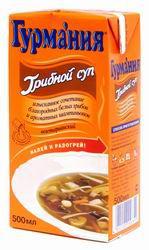
Production of liquid soups "gourmets" of Mars was launched in 2004. Creative serve "gourmet" is engaged in agency BBDO Moscow. Five years later, the manufacturer has officially announced that, despite the multi-million dollar investment in the production and promotion of soups, brand "gourmets" failed.
Most experts agree that the culprit is not very good positioning: Mars launched the brand, which was expensive (about 70 rubles) for most of the target audience of these products and do not fit into the concept of ready-made fast food. There were also suggestions that the product - instant soup - does not match the preferences of Russian consumers, as our hostess love and know how to cook at home themselves.
"Gourmets" was not the first soup, which left the Russian market. Earlier, the market had already gone soups brands such as Uncle Ben's and Knorr.
Dougan
Vodka "Dovgan" with the portrait of Vladimir Dovgan appeared on store shelves in late 1995. In 1997, the portrait adorned Dovgan has 200 kinds of products - tea, oatmeal, toothpaste, mayonnaise. And he appeared on television program "Dougan show", the Prize among consumers.
However, in 1999, the founder and face of the brand by Vladimir Dovgan Affairs stepped in connection with political activities and the release of a variety of products under the brand "Dovgan" stopped. Until 2002, the vodka brand passed from hand to hands of different owners, and after all disappeared from the shelves.
Case "Dovgan" appears in many books and articles on marketing. One reason for the collapse is called the incorrect positioning of the brand. Advertising was held under the slogan "Dougan - Protected Quality". And in the middle of the troubled 90th person on the product Dovgan was kind orientrom quality. However, over time the consumer has come to the realization that all goods must be of high quality, and the brand has lost its value.
Other experts tend to believe that "Dovgan" - a brand with a human face, which immediately fell through after the company's founder left his post of chairman and first became interested in Orthodoxy, then network marketing and business training.
Blue Water
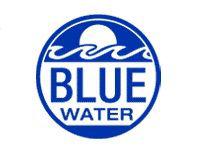
A well-known story of the failure of bottled water «Blue Water» («blue water»).
In the late 1990s the company F & K Waterhouse launched on the Russian and Ukrainian markets, large-scale advertising campaign of the product. The ambiguity of the harmless-looking name has become clear, when television commercials became speaker with delight saying: "Blue Vota!". The product has not gone. In recent years, Blue Water takes no more than 0.01% of the Russian market in 2007 and completely disappeared from sight research companies.
Bledina
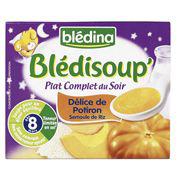
In the early '90s he promoted Danone in Russia French brand of baby food Bledina. Mark was widespread in Europe and had a high success. However, the Russian market was clearly ordered him. The culprit, of course, the name. Few dared to Russian mothers feed their baby to nasty dessert called "Bleddyn».
In recognition of the former marketing manager of Danone in Russia, Russian managers bombarded the headquarters of Danone calls, letters and faxes on "Name Bledina causes inadequate reaction of the Russian." However, the French responded only accusations: You Russian nothing ponimaetet in marketing, and its inability to sell and promote global brands justify some nonsense. The brand is sold very well in Slovakia. There is also talk in the Slavonic language, which is the same as the Russian. The product does not sell, because the bad moves. It is necessary to strengthen the promotion. A need for the success of the correct slogan. Right slogan should be "Bleddyn - everything you need for your child!".
In memory of Russians brand will forever remain a part of the parody Igor Ugolnikova "Bleddyn nourished the whole world."
Stimorol
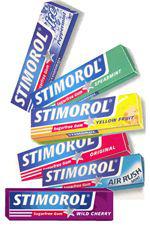
The spread on the Russian market of chewing gum Stimorol Danish company started in 1992 with a TV commercial about the cops and bikers. The video was very popular and because of this active start Stimorol managed to create competition chewing gum Wrigley, which at the moment virtually monopolized the market in the country.
In 2002 the company acquired the Stimorol Cadbury-Schweppes and chewing gum from the Russian market gradually disappeared. Her place was taken by another brand of chewing gum from Cadbury - Dirol.
Why are some Russian and Western brands do not take root in the Russian market? The reasons for this are many, and each case is unique disastrous. Sometimes the culprit naming illiterate, sometimes - a bad brand character, and sometimes wrong positioning.
Skeletons

Products under the brand name "Skeleton" went on sale in autumn 2004 as a line of dairy products for children, out-of-age consumption Rastishka. Neymer and top management of the campaign rightly decided that children aged 9 to 14 years old love nestrashnye horror. Brand characters become heroes skeleton - on product packaging painted skeletons, skull and crossbones, and the campaign slogan - "Take care of the children of his skeleton».
But buyers-just scared and parents names and the four characters. Danone's even threatened litigation: Muscovite Yevgeny Martynov required stop output, injuring the child's psyche. On the part of outraged citizens rose up and some advertisers and market participants. "Skull with bones should be placed not on the packaging of products, and to draw on the poison for mice - commented the creative director of DDB Russia Kirill Smirnov.- What children like violence, does not mean that it should promote."
Later Martynov refused the claim, but the line after some time still had to fold. Beer "Ruski»
Kazan company "East is Red" brand led "Ruski" to the market in June 2002. but in September it was decided to stop its production because of the huge number of protests of those who do not agree with the free treatment of the Russian language. Consumers actively resented tolerance spelling errors in the title and beer advertising "In Rooskey."
The name of the brand was invited to the leadership of the "Red East". Creative services agency took over the brand new NFQ, ceased to exist in 2009. The campaign was held under the slogan "Beer for ..." Ruski ". The soul wide open ", in advertising and on the labels of" Ruski "indicates that it is" a traditional Russian beer brewed by prescription in 1892. "
in May 2003 the new brand with the unfortunate name phonetically, perceived by all as a misspelled word, disappeared from the list of projects "Red East". Kazan plant began to brew beer, "Czech standard".
Sweets "Power»
In 2000, Mars has launched a project for the production of chocolate loose sweets "Power". The manufacturer decided to create their own thematic series of 10 - "Countries", "Heroes of fairy tales", "Russian Emperors", "World Masterpieces" and so on. On the reverse side of the candy wrappers printed stories about the country or the emperor. Educational texts on the wrapper had to revive the traditional tea. This was reflected in the advertising slogan "power" - "Treats for communication."
The first candy "Power" went on sale simultaneously with tizingovoy advertising. "10 series, which will speak the whole country", "Soon, the streets are empty," "My husband will return to work on time", "Thousands of women will relish the details" - such boards intrigued Russians on the streets.
However, because of the ease in the package (the US corporation Mars claimed that the product is necessarily Intact) candy could be sold only in boxes, and so were in the premium segment. Instead of the planned 105-140 rubles. 1 kg price of the new brand was 210-240 rubles. 1 kg. As a result, three years later the project was abandoned.
Gourmania

Production of liquid soups "gourmets" of Mars was launched in 2004. Creative serve "gourmet" is engaged in agency BBDO Moscow. Five years later, the manufacturer has officially announced that, despite the multi-million dollar investment in the production and promotion of soups, brand "gourmets" failed.
Most experts agree that the culprit is not very good positioning: Mars launched the brand, which was expensive (about 70 rubles) for most of the target audience of these products and do not fit into the concept of ready-made fast food. There were also suggestions that the product - instant soup - does not match the preferences of Russian consumers, as our hostess love and know how to cook at home themselves.
"Gourmets" was not the first soup, which left the Russian market. Earlier, the market had already gone soups brands such as Uncle Ben's and Knorr.
Dougan
Vodka "Dovgan" with the portrait of Vladimir Dovgan appeared on store shelves in late 1995. In 1997, the portrait adorned Dovgan has 200 kinds of products - tea, oatmeal, toothpaste, mayonnaise. And he appeared on television program "Dougan show", the Prize among consumers.
However, in 1999, the founder and face of the brand by Vladimir Dovgan Affairs stepped in connection with political activities and the release of a variety of products under the brand "Dovgan" stopped. Until 2002, the vodka brand passed from hand to hands of different owners, and after all disappeared from the shelves.
Case "Dovgan" appears in many books and articles on marketing. One reason for the collapse is called the incorrect positioning of the brand. Advertising was held under the slogan "Dougan - Protected Quality". And in the middle of the troubled 90th person on the product Dovgan was kind orientrom quality. However, over time the consumer has come to the realization that all goods must be of high quality, and the brand has lost its value.
Other experts tend to believe that "Dovgan" - a brand with a human face, which immediately fell through after the company's founder left his post of chairman and first became interested in Orthodoxy, then network marketing and business training.
Blue Water

A well-known story of the failure of bottled water «Blue Water» («blue water»).
In the late 1990s the company F & K Waterhouse launched on the Russian and Ukrainian markets, large-scale advertising campaign of the product. The ambiguity of the harmless-looking name has become clear, when television commercials became speaker with delight saying: "Blue Vota!". The product has not gone. In recent years, Blue Water takes no more than 0.01% of the Russian market in 2007 and completely disappeared from sight research companies.
Bledina

In the early '90s he promoted Danone in Russia French brand of baby food Bledina. Mark was widespread in Europe and had a high success. However, the Russian market was clearly ordered him. The culprit, of course, the name. Few dared to Russian mothers feed their baby to nasty dessert called "Bleddyn».
In recognition of the former marketing manager of Danone in Russia, Russian managers bombarded the headquarters of Danone calls, letters and faxes on "Name Bledina causes inadequate reaction of the Russian." However, the French responded only accusations: You Russian nothing ponimaetet in marketing, and its inability to sell and promote global brands justify some nonsense. The brand is sold very well in Slovakia. There is also talk in the Slavonic language, which is the same as the Russian. The product does not sell, because the bad moves. It is necessary to strengthen the promotion. A need for the success of the correct slogan. Right slogan should be "Bleddyn - everything you need for your child!".
In memory of Russians brand will forever remain a part of the parody Igor Ugolnikova "Bleddyn nourished the whole world."
Stimorol

The spread on the Russian market of chewing gum Stimorol Danish company started in 1992 with a TV commercial about the cops and bikers. The video was very popular and because of this active start Stimorol managed to create competition chewing gum Wrigley, which at the moment virtually monopolized the market in the country.
In 2002 the company acquired the Stimorol Cadbury-Schweppes and chewing gum from the Russian market gradually disappeared. Her place was taken by another brand of chewing gum from Cadbury - Dirol.



